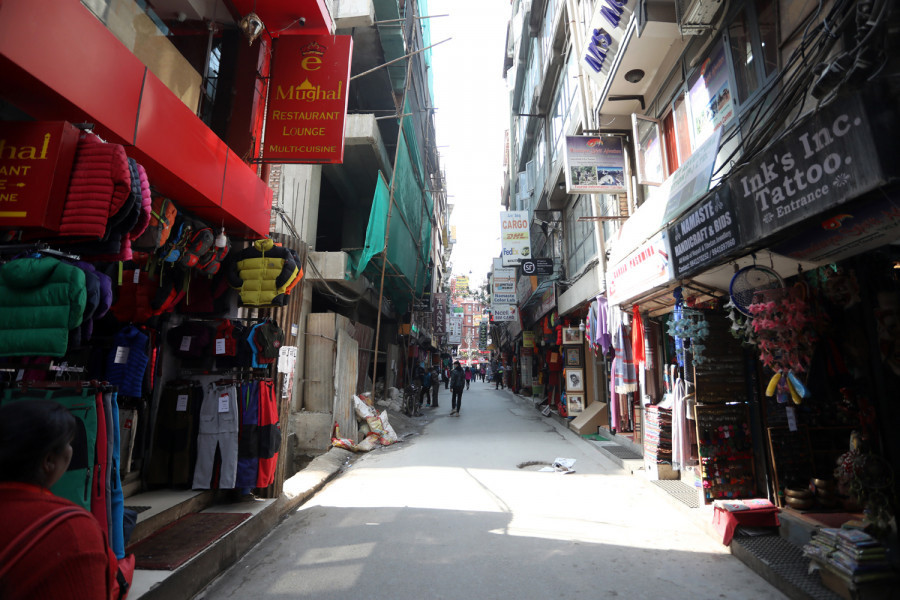Money
Covid-19 affected businesses to protest demanding relief and rehabilitation package
Entrepreneurs say that the refinance facility has not been available to the small and medium scale enterprises.
Prithvi Man Shrestha
Ram Hari Sharma, proprietor of Mahalaxmi Vehicle Service Private Limited, which provides transport services to the foreign tourists, expanded his fleet of 50 vehicles with 10 more hoping to cash in on the Visit Nepal Year-2020.
He spent a total of Rs70 million, including Rs50 million in loans, to purchase them. But now the investment is haunting him as he has no other option other than to park them as the tourism sector has been devastated by Covid-19 pandemic.
The government has already reopened public transportation services. But, Sharma’s vehicles were not registered as public vehicles with black number plates.
“So, my vehicles have continued to remain parked in the garage while banks continue to send notices seeking repayment of their loans,” Sharma said.
Sharma who is also the president of Nepal Tourism Transportation Association, said the situation is similar for almost all transport companies that cater to foreign tourists.
As many as 80 transport entrepreneurs associated with the association own over 2700 vehicles, according to Sharma.
“Banks are issuing auction notices to sell vehicles of transport entrepreneurs focussed on serving the tourists,” he said.
Nepal Tourism Transportation Association is one of the many representative bodies of medium and lower-medium scale entrepreneurs who have formed a struggle committee seeking relief for Covid-19 affected businesses.
Other representative bodies include: Public Transport Central Federation, a dozen associations related to tourism including Hotel Association of Nepal, representative organisation of private schools including Private and Boarding Schools’ Organisation Nepal and National Private and Board Schools’ Organisation Nepal and Guardians’ Association, Federation of Nepal National Party Palace and Catering Entrepreneurs Association, Nepal Construction Material Traders’ Association, National Ayurved Association, Additional Postal Association, Federation of Gold and Silver Dealers Association, Nepal Woodcraft Association and Furniture and Furnishing Association.
They formed a ‘struggle committee of pandemic affected entrepreneurs’ last week and met senior officials of the government and the Nepal Rastra Bank over the last one week.
Among their key demand are exemptions of taxes and fines for the businesses which have remained closed due to the pandemic, exemption in the interest of bank loans and rents to be paid the landlords, availability of as much as 50 percent salary for the staff of the Covid-19 affected enterprises and soft loans among others.
They have asked the government to address their demands in seven days and vowed to launch a protest programme thereafter.
They announced discontinuing paying the tax, launching street protests with public vehicles and encircling the Singh Durbar and Nepal Rastra Bank among others.
The government has started implementing its announced relief package of Rs50 billion under which small and medium enterprises and tourism businesses can get loans at an interest rate of five percent.
The central bank has started providing a refinance facility where around Rs70 billion has already been released, according to Dev Kumar Dhakal, executive director at Nepal Rastra Bank.
But, agitating the entrepreneurs said that the refinance facility has not been available to the small and medium scale enterprises.
“Based on what the deputy governor told us during the meeting, the refinance facility of over Rs50 million has just been provided to large hotels, schools and hydropower projects,” said Sharma.
The refinance facility above Rs50 million is provided on a case to case basis. But, there is another window of receiving refinance facilities under which a firm affected by the pandemic can get a refinance facility upto Rs50 million.
But, agitating entrepreneurs said that many of them have not got the facility.
As part of the relief, the central bank has extended the deadline for paying loan instalments by six months, nine months and one year, depending on the degree of impact on the particular sector as it seeks to provide succour to businesses hit by the pandemic.
“Banks and financial institutions have not followed this policy properly. The deadline was not extended for a number of transport entrepreneurs even though they had paid instalment till mid-July,” said Krishna Kumar Rijal, acting president of Public Transport Central Federation. “Some development banks have charged interest of over 15 percent even though the average interest rate has gone down drastically in recent months.”
Even though the government relaxed all restrictions for the public transportation, transport entrepreneurs said that they have not been able to put all their vehicles on the road due to less movement of people compared to normal times.
“My dozen buses and micro-buses are in the garage due to the lack of passenger movement and the lack of money to conduct maintenance works after they were garaged for several months,” said Rijal, who is also the proprietor of Kathmandu-Kerung Yatayat Private Limited. “Kathmandu-Rasuwagadhi road remains busy when smooth trade takes place between Nepal and China. But, trading activities through this route has slowed and there is little movement of people on this route.”
Schools have also been badly affected by the pandemic and most of the schools have remained closed due to the pandemic. They are taking online classes but a large number of students have been deprived of learning due to lack of internet facility.
“The biggest impact of schools being closed has been on students,” said Karna Bahadur Shahi, immediate past president of National Pabson, a grouping of the private schools. “But private schools have also been unable to pay the teachers and other staff. Even well-known schools are struggling to pay even half of the staff salary.”




 18.12°C Kathmandu
18.12°C Kathmandu













